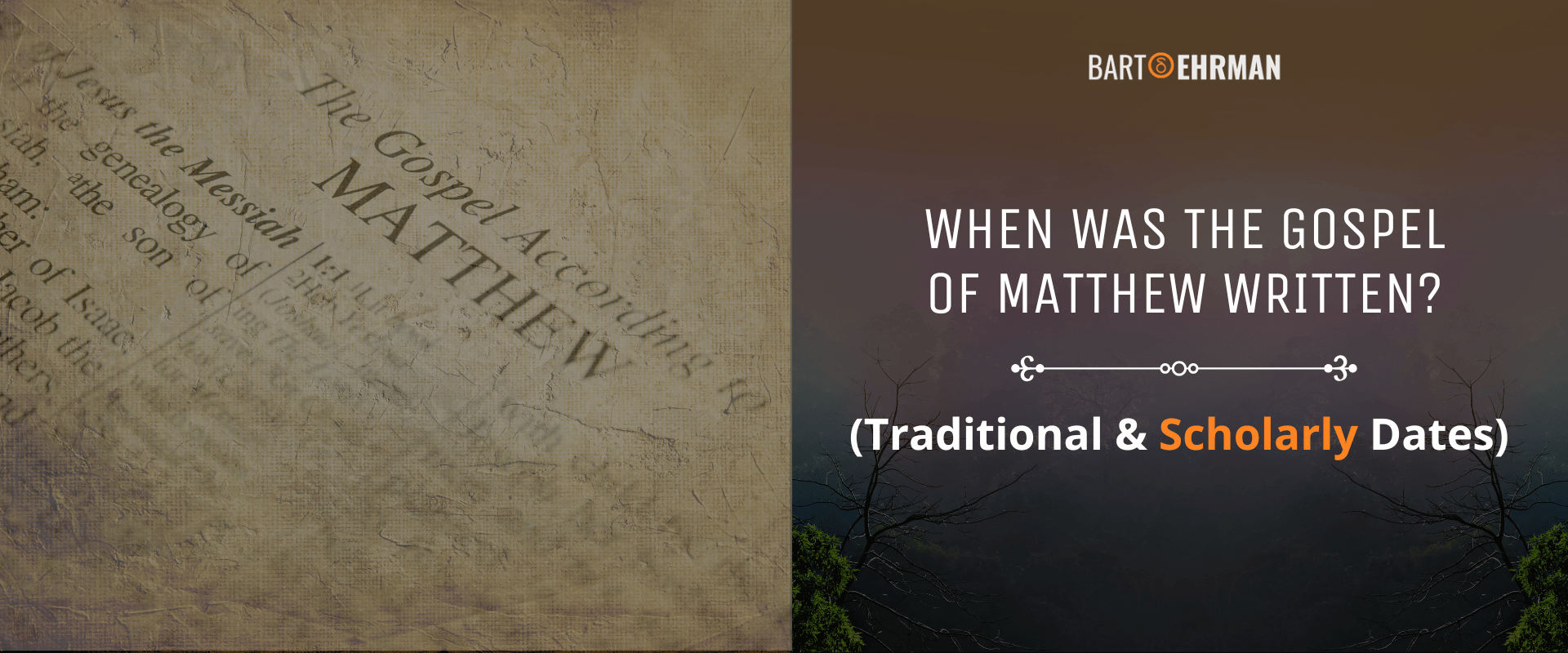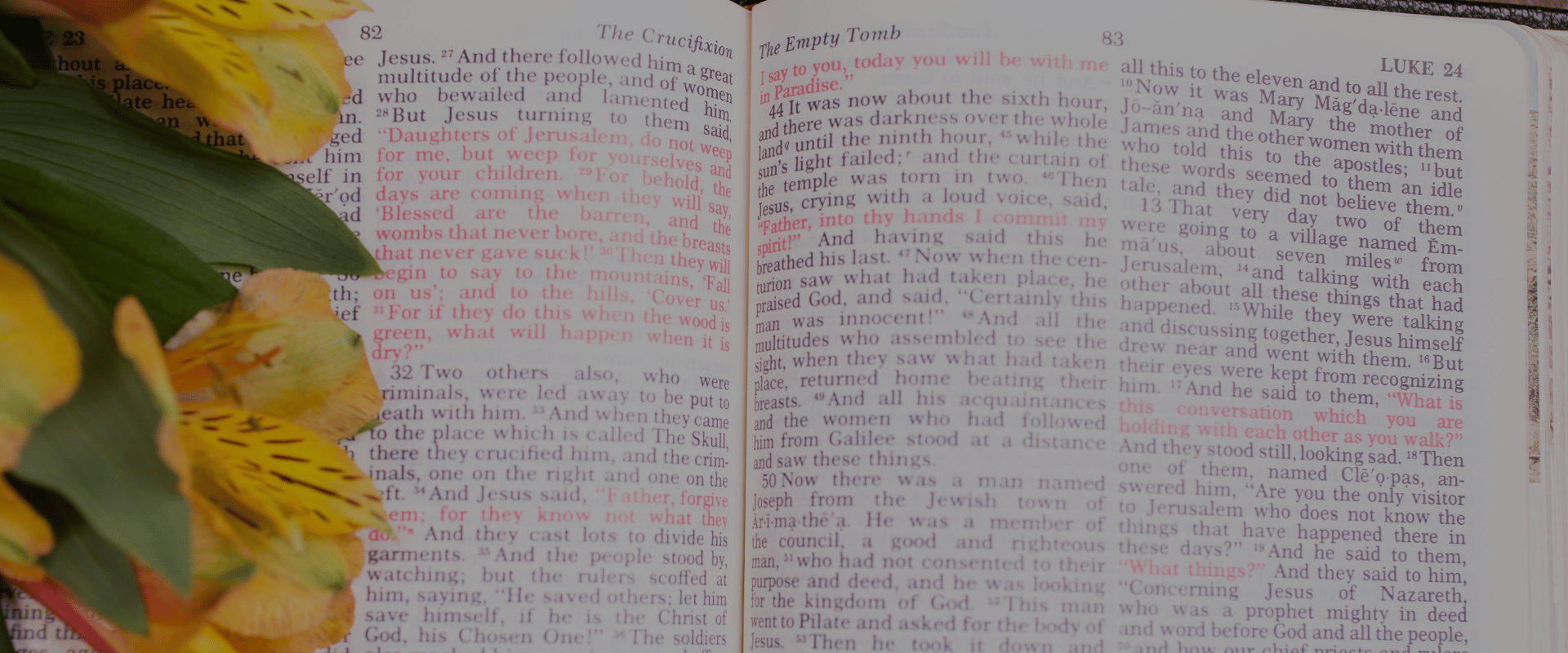When Was the Gospel of Luke Written?

Written by Marko Marina, Ph.D.
Author | Historian
Author | Historian | BE Contributor
Verified! See our guidelines
Verified! See our editorial guidelines
Date written: November 25th, 2024
Edited by Laura Robinson, Ph.D.
Disclaimer: The views and opinions expressed in this article belong to the author and do not necessarily match my own. - Dr. Bart D. Ehrman
The New Testament is a collection of remarkable books that offers us a window into the earliest days of Christianity. Among these texts, the Gospel of Luke stands out for its detailed portrayal of Jesus' life and ministry. When was the Gospel of Luke written, and what are some of its themes? People are also interested in its unique connection to a second volume: the Acts of the Apostles.
Together, these two works, commonly referred to as Luke-Acts, form the longest single literary piece within the New Testament, weaving a grand narrative that begins with the births of Jesus and John the Baptist and ends with the Apostle Paul’s arrival in Rome. Luke-Acts doesn’t merely tell a Gospel story — it ventures into history, chronicling the spread of the Christian movement across the Mediterranean world.
What makes Luke-Acts particularly captivating is its blend of historical events, religious traditions, and emerging legends, a tapestry covering roughly sixty years. As the first history of Christianity, it captures the early church’s joys, struggles, and aspirations, offering readers a glimpse into how the early followers of Jesus interpreted his life and teachings.
Yet for all the detail it provides, questions of its dating remain elusive. Knowing when its author wrote it helps us understand the context in which early Christians were living, the challenges they faced, and how their beliefs and practices evolved. Dating the text could reshape our perception of Christianity’s development, shedding light on the social, political, and theological currents that shaped the early church.
In this article, we’ll examine the clues and debates surrounding the dating of Luke’s Gospel. We'll look at the traditional view — which claims it was written relatively early by Luke, a companion of Paul — alongside a more critical scholarly perspective that points to a later composition.
By exploring the evidence and arguments, we aim to better understand the origins of this influential text and what it reveals about the formative years of Christianity.
As we move into the world of early Christianity, I must invite you to check out Dr. Bart D. Ehrman’s riveting course, “The Unknown Gospels.”
In eight 30-minute lessons, Dr. Ehrman provides a fresh and scholarly analysis of the documents that shaped the development of the Christian religion. If you have ever wondered where the line is drawn between history and myth in the New Testament Gospels, this course is for you!

Understanding Luke: Background and Key Questions
Before exploring the issues and debates surrounding when the Book of Luke was written, it’s essential to consider some foundational aspects of this Gospel. A brief look at its key themes, authorship, and intended audience will provide the necessary context for understanding this complex question.
The Gospel of Luke: Summary
The Gospel of Luke (dedicated to a certain Theophilus) offers a detailed and theologically fueled account of the life, ministry, death, and resurrection of Jesus, presenting a narrative that emphasizes Jesus' compassion and outreach to marginalized groups, including the poor, women, and non-Jews.
In his book, The New Testament: A Historical Introduction, Bart D. Ehrman and Hugo Mendez explain the thematic essence of the Gospel of Luke: “For Luke, the message of God comes to his people in their most sacred city, Jerusalem, in the most sacred of all sites, the Temple; but this message is not meant only for the Jews. In Luke’s view, it is a message of salvation for all people.”
(Affiliate Disclaimer: We may earn commissions on products you purchase through this page at no additional cost to you. Thank you for supporting our site!)
Starting with the intertwined birth stories of John the Baptist and Jesus, Luke’s Gospel follows Jesus through his ministry in Galilee, his journey to Jerusalem, and, ultimately, his crucifixion and resurrection.
Notably, Luke includes parables and teachings that are unique to his account, such as the Good Samaritan and the Prodigal Son, highlighting themes of mercy, forgiveness, and social justice. In addition to portraying Jesus' life, Luke situates his Gospel within a broader historical setting, mentioning events and figures from the Roman Empire and referencing Jewish history and traditions.
For those interested in a more detailed exploration, we have an entire article devoted to the summary of Luke’s Gospel. Check it out. You won’t be disappointed!
Gospel of Luke: The Issue of the Authorship
In our exploration of when the Gospel of Luke was written, we should first address the question of authorship. Traditionally, the Gospel has been attributed to Luke, identified as a companion of Paul, and mentioned in a few New Testament letters, specifically Colossians, Philemon, and 2 Timothy.
This view, which suggests that Luke the physician was also the author of Acts, is first attested by late 2nd-century sources such as Irenaeus and the Muratorian Canon. Yet, as with most matters in biblical scholarship, the story doesn’t end here.
Most scholars today, however — though not all (Joseph A. Fitzmyer being a notable exception) — believe that the Gospel and Acts were actually written by an anonymous Christian who, while certainly well-informed, likely had no personal connection to Paul.
This argument rests on both internal evidence (contradictions and discrepancies between the author of the Gospel and Paul’s undisputed letters) and the lack of early external attestation. Delbert Burkett, in his book An Introduction to the New Testament, concludes:
Many scholars reject the tradition that the author was Luke or that he was Paul’s traveling companion because the information in Luke-Acts does not always agree with what we find in Paul’s letters. If the author were close to Paul, we would expect the information to agree.
For those curious about the finer points of this debate (and who doesn’t love a little authorship mystery?), we have an entire article devoted to this question — perfect for when you need a break from debating dating!
Who Was Luke Written To?
Although the Gospel of Luke is addressed to a figure named Theophilus, it would be a mistake to assume it was meant solely for one person’s reading pleasure. Like a letter addressed to a specific friend but intended for all to read, the Gospel was likely crafted for a broader community.
Mark A. Powell notes that “most likely, Theophilus was the person responsible for commissioning the project, a wealthy patron who has put up the money to cover the considerable cost that the production and distribution of a work such as this would entail.”
Which community, specifically? Who was Luke written to? That’s where the trail goes cold. Despite the best efforts of scholars, we’re left without a clear answer.
In his Commentary on Luke, Joseph A. Fitzmyer explains:
As for the place of composition of the Lucan Gospel, it is really anyone's guess. The only thing that seems certain is that it was not written in Palestine. The ancient tradition about the place of composition varies greatly: Achaia, Boeotia, and Rome. Modern attempts to localize the composition elsewhere are mere guesses: Caesarea (H. Klein), Decapolis (R. Koh), Asia Minor (K. Loning). In the long run, it is a matter of little concern, because the interpretation of the Lucan Gospel and Acts does not depend on it.
So, while we can imagine a group of early (Gentile?) Christians gathering to hear the Gospel of Luke, we simply don’t know where this community was located. Sometimes, history is silent and we must acknowledge complete agnosticism.
With this foundational context in place, we can now turn to the central question: When was the Gospel of Luke written?
FREE COURSE!
WHY I AM NOT A CHRISTIAN
Raw, honest, and enlightening. Bart's story of why he deconverted from the Christian faith.
Over 6,000 enrolled!
When Was the Gospel of Luke Written: Traditional vs. Scholarly Theory
The traditional dating of the Gospel of Luke, upheld by early Church tradition, places its composition relatively early. In this framework, Luke’s close association with Paul is seen as lending historical credibility to his account, with Church Fathers such as Irenaeus and the Muratorian Canon supporting this view.
Advocates of this early dating often point to the abrupt ending of Acts — where Paul is under house arrest in Rome but his fate remains unknown — as an indication that both the Gospel of Luke and Acts were written before Paul’s death.
In his Commentary on Luke, evangelical scholar Leon Morris dismisses common scholarly arguments as “subjective estimates of the possibilities,” claiming that "on the whole, there seems most to be said for a date in the early 60s. The evidence comes short of complete proof, but there seems more to be said for this view than for either of the others."
As noted, most scholars would disagree with Morris’ conclusion, placing the composition of Luke’s Gospel a couple of decades later. Let’s take a look at their arguments.
When Was the Book of Luke Written? Scholarly View
When was the Gospel of Luke written? According to the “communis opinio,” Luke’s Gospel was written between 80 and 100 C.E. This theory rests on several critical arguments that consider internal textual evidence and historical context.
Scholarly Insights
One fascinating theory about dating the Gospel of Luke comes from historian Steve Mason, who proposes a literary connection between Luke-Acts and the writings of the Jewish historian Josephus.
Mason argues that several distinctive scenes, characters, and themes in Luke-Acts align closely with those found in Josephus’ Antiquities, which was completed around 93-94 CE. Could Luke have had a copy of Josephus' works on his desk while composing his Gospel? If so, this would push the date of Luke-Acts to the early second century C.E.
Mason’s theory rests on detailed narrative parallels, such as the mention of the Egyptian prophet and Judas' rebellion, both of which appear in Josephus with strikingly similar detail.
Mason goes further, suggesting that the shared depictions of groups such as the Pharisees and Sadducees in both works are too specific to be coincidental. He believes that Luke carefully adapted Josephus' portrayal of these groups for his Christian audience, borrowing Josephus’ characterizations to enhance his historical narrative.
While most scholars have yet to embrace Mason’s conclusions, his argument invites us to reconsider traditional assumptions about the sources and influences behind the Gospel of Luke. Whether you find Mason’s case compelling or prefer the more established dating, his hypothesis offers an intriguing window into the complex world of early Christianity.
First, Luke’s reliance on the Gospel of Mark is a key factor. Scholars generally agree that Mark was written between 65 and 70 C.E., likely before or around the time of the Roman siege of Jerusalem.
Since Luke appears to use Mark as a source, it follows that Luke’s Gospel would have been composed sometime afterward. This dependency on Mark is part of what positions Luke later in the first century, ruling out dates earlier than 70 C.E.
Another significant factor is Luke’s apparent knowledge of the Roman destruction of Jerusalem, which took place in 70 C.E. Luke’s version of Jesus’ prophecy regarding Jerusalem (Luke 21:20–24) shifts the focus from the Temple itself to the city, portraying its destruction with specific details like “Jerusalem surrounded by armies.”
Mark A. Powell, for instance, observes that certain passages in Luke — such as 11:49-51, 13:34-35, 19:41-44, 21:20-24, and 23:28-31 — appear to respond to issues or concerns that may have arisen following the destruction of Jerusalem in 70 C.E. This timing would align with the idea that Luke had access to Mark’s Gospel when writing his account.
Scholars also consider the larger historical and theological developments within early Christianity as evidence for a later date. Luke’s Gospel and its sequel, Acts, reflect a more organized and expanding Christian movement, with a growing interest in reaching Gentile audiences.
Furthermore, scholars note that the absence of any reference to Paul’s letters in Luke-Acts further supports the idea that the Gospel was written in the last decades of the 1st century.
The absence of references to Paul’s letters in Acts suggests (with other arguments already mentioned) that Luke wrote before these letters were widely recognized as key sources within the Christian community. This points to a date before the early second century when Paul’s letters began to gain authoritative status.
What about the supposed abrupt ending of Acts without any explicit mention of Paul’s death? Could that be a valid argument supporting the early dating of Luke-Acts? Not exactly!
In his Commentary on Luke, Michael Wolter explains that the “assumption that Paul was still alive when Luke ended Acts is based on a failure to recognize the genre of Luke-Acts. Luke is not writing a biography of Paul, and he can therefore end his work without reporting the death of Paul.”
In other words, Luke’s purpose was to chronicle the spread of the Christian message with a specific theological agenda, not provide a complete life story of its messengers. So, the end of Acts isn’t necessarily a cliffhanger — it’s simply where Luke chose to close the narrative.
Can we pinpoint the exact date of composition? Fitzmyer asserts that the “best solution is to adopt the date for Luke-Acts that is used by many today, ca. A.D. 80-85." Similarly, Brown claims that the “best date would seem to be 85, give or take five to ten years.”
Moreover, he argues that the Gospel was probably composed by the end of the 1st century. He explains:
The Gospel’s symbolic interest in Jerusalem as a Christian center does not match the outlook of 2nd-century Christian literature. For Asia Minor and specifically for Ephesus, the writer of Acts seems to know only a church structure of presbyters (Acts 14:23; 20:17). There is no sign of the developed pattern of having one bishop in each church so clearly attested by Ignatius for that area in the decade before 110.
Wolter, on the other hand, is more cautious, asserting that a “clear terminus ante quem is only given by the quotations from the Gospel of Luke in Justin Martyr in the middle of the second century. Every more precise temporal placement is dependent on hypothetical auxiliary assumptions” (italics added). Wolter himself hypothesizes in favor of the 80s of the 1st century.
Therefore, most scholars today favor a date between 80 and 100 C.E. for the Gospel of Luke. This range accounts for Luke’s use of Mark, the apparent knowledge of Jerusalem’s fall, and the historical-theological setting of the early Christian movement as depicted in Luke-Acts.

Conclusion
I must admit, I enjoy reading the Gospel of Luke. The Greek is beautifully crafted, and the rhetorical skill on display suggests that the author was someone who would certainly have made an engaging intellectual friend — perhaps over a few lively debates (with beers, of course!).
But behind the nice prose lies a fundamental question that continues to captivate scholars and readers alike: When was the Gospel of Luke written?
From the traditional early dating, upheld by the Church Fathers, to the more cautious and objective views of modern scholars who place it in the last decades of the first century, the question remains complex.
While we may never pinpoint the exact year of its composition, exploring the various scholarly perspectives enhances our understanding of how this Gospel, and the early Christian movement it reflects, evolved. And perhaps, like all enduring mysteries, part of the appeal is that there will always be more to discover.
FREE COURSE!
WHY I AM NOT A CHRISTIAN
Raw, honest, and enlightening. Bart's story of why he deconverted from the Christian faith.
Over 6,000 enrolled!
